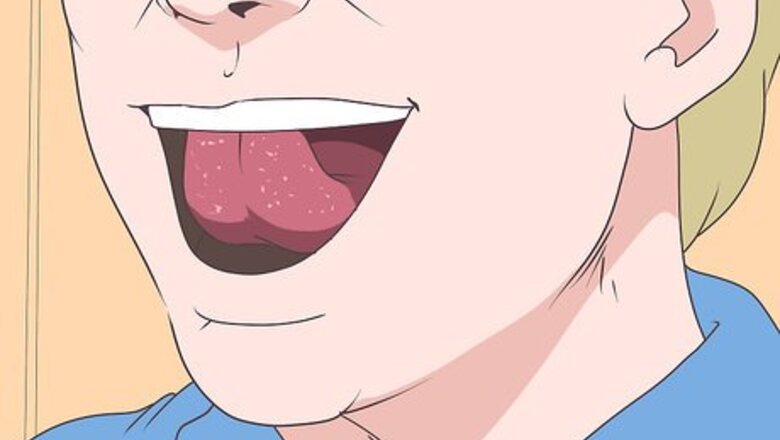
views
- Touch your tongue to the roof of your mouth and open your mouth wide for 5-10 seconds. Then, push your lower jaw as far out as you can and pull it back in.
- Or, place a pencil between your teeth. Slide your jaw forward without dropping the pencil and hold for 20 seconds.
- Find the notches of your masseter muscles under your cheekbones. Press your fingers into the notches and knead them for 30-60 seconds.
Stretching and Strengthening Your Jaw
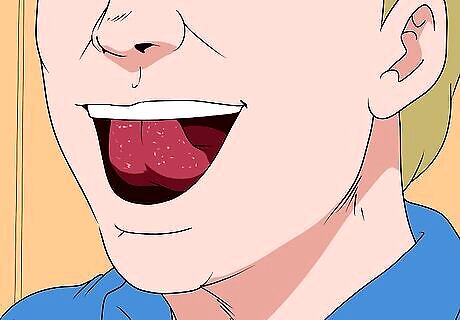
Repeat a series of 3 simple jaw stretches every evening. Do each of the following for 5-10 seconds as you get ready for bed: Touch your tongue to the roof of your mouth, then open your mouth as wide as you can without pain. Keep your tongue against the roof of your mouth, then slide your lower jaw as far out as you can. After that, slide it in as far as you can. Open your mouth as wide as you comfortably can, with your tongue in a neutral position. Then, close your mouth and reopen it slightly, slide your jaw to the left for 5-10 seconds, then slide it to the right for 5-10 seconds.
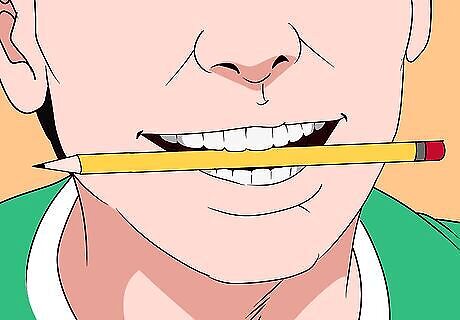
Add a jaw stretch using a pencil to your nightly routine. Clamp a pencil, paintbrush, or similar object between your front teeth, securely but not forcefully. Slowly glide your lower jaw forward as far as you comfortably can, without letting the object fall out of your mouth. Hold the position for 20 seconds. Try doing this 2-3 times nightly before bedtime. Over time, you may be able to do this exercise with a thicker object, like a child’s easy-grip pencil.
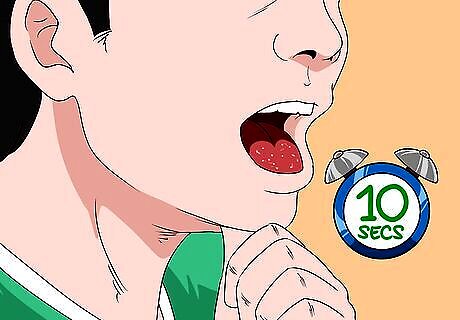
Press your thumb to your chin as a wake-up exercise. Hold your thumb firmly against the underside of your chin. Press your thumb up with moderate force and open your mouth until it is comfortably wide, against the resistance of your thumb. Hold the position for 5-10 seconds. The resistance provided by your thumb makes this a jaw strengthening exercise. Try doing this exercise 2-3 times each morning.
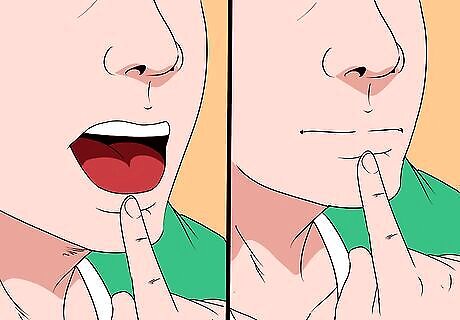
Follow up with a second jaw exercise using your index finger each morning. Touch your index finger between your lower lip and your chin, then open your mouth comfortably wide. Press your finger against the front of your jaw with moderate force, and slowly close your mouth against this resistance. This strengthening exercise targets different areas of your jaw muscles than the thumb exercise. Repeat this exercise 2-3 times each morning.
Massaging Your Masseter Muscles
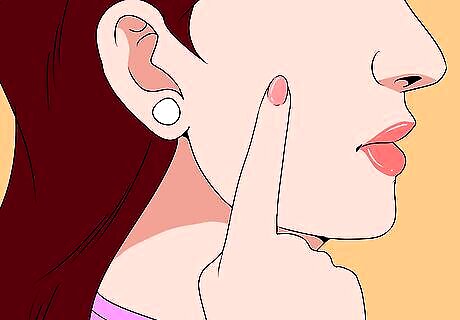
Locate the notch in front of your ear and under your cheekbone. Press your fingertip against the underside of your cheekbone, about 1 in (2.5 cm) in front of your ear. After some probing, you should find a small indentation or notch. This is a pressure point that you can use to massage your masseter muscle. Located on both sides of your face, your masseter muscles power your jaw, especially when you bite or chew. Based on their size, your masseter muscles are the strongest muscles in your body.
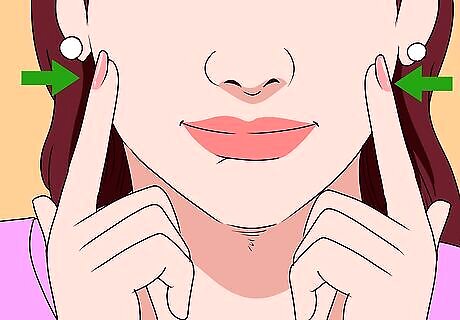
Press your finger, thumb, or knuckle into the notch. Push inward and slightly upward with your fingertip until you feel a “sweet ache”—in other words, the soothing but slightly painful feeling you probably associate with a massage. If you find it difficult to press firmly enough with your fingertip, try your thumb or knuckle. Don’t aim for outright pain here—push until you feel only slight discomfort.
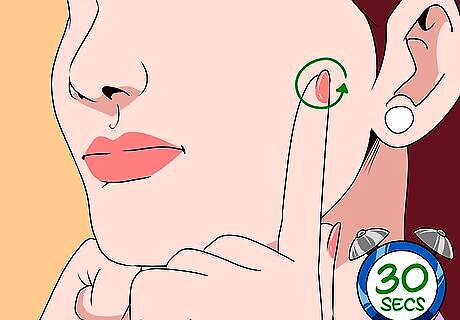
Apply constant pressure or kneading circles to the notch. Once you have the pressure right, you can simply hold your finger, thumb, or knuckle in place. Alternatively, try making small circles with your finger, thumb, or knuckle while maintaining pressure on the notch. Massage the area for 30 seconds to 1 minute, then switch to your other cheek. Do this massage every night before bedtime. You can also do it when you wake up in the morning, and any other time that your jaw feels tight.
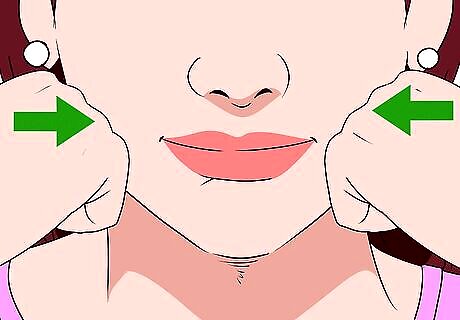
Increase the pressure you apply over time. Since your masseters are such dense, strong muscles, it can take a lot of pressure to soothe and loosen them. Over time, you’ll probably find that you need to apply greater pressure to get the same results. That’s fine—your masseters can handle it! Switch to using your knuckle if you can’t apply adequate pressure with your finger or thumb.
Addressing Clenching, Grinding, or Pain

Relieve stress with light exercise, yoga, or other methods. There’s a good chance that you respond to stress by clenching your jaw or grinding your teeth, even if you don’t realize it. These are very common stress responses that can cause jaw tightness and pain, as well as dental problems. By better managing the stress in your life, you’ll reduce these behaviors. Find the stress-busters that work best for you. You might use meditation, deep breathing exercises, progressive muscle relaxation, visualization techniques, walking in nature, talking to a good friend, or listening to soothing music, among many other options. Make a point of using your stress-busters within 1-2 hours of bedtime, as well as throughout the day.
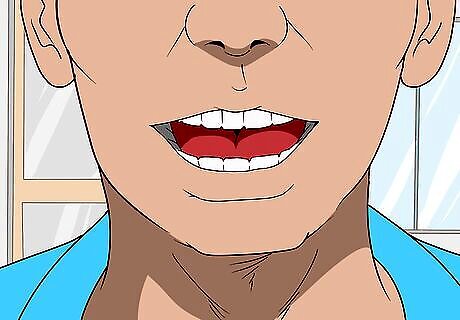
Train yourself to keep your teeth separated during the day. If easing your stress isn’t enough to reduce your jaw clenching or teeth grinding, try to catch yourself in the act throughout the day. When you notice it, focus on holding your mouth in the proper position—teeth slightly apart, tip of the tongue touching the roof of the mouth just behind the front teeth. Ideally, your teeth should only touch when you’re eating. You can also try holding your mouth open wide (but not painfully wide) for 1-2 minutes at a time whenever you notice yourself clenching or grinding. This might not be a good idea during a budget meeting, though!
Cut back on chewing tough foods and clenching non-food items. While the masseter muscles that power your jaw are some of the strongest muscles in your body, you can still overwork them by chewing. During the day, and especially as bedtime nears, avoid hard-to-manage foods like a tough steak, chewy candy, or a whole carrot. Skip chewing gum as well, especially in the evening if you get nighttime jaw pain. Also avoid clenching your teeth around non-foods like pencils, straws, or toothpicks.
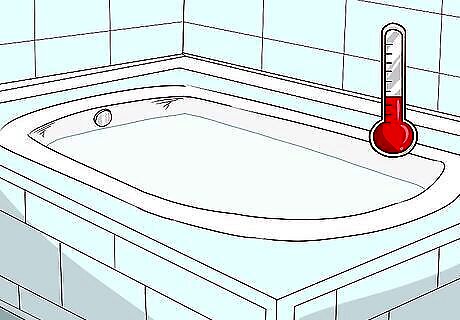
Take a warm bath to ease stress and soothe your muscles. Taking a nightly soak in a warm bath offers many benefits, including jaw relaxation. For instance: The warm water and moist air help to loosen and relax your jaw (and other) muscles. Warm baths are calming and will help reduce your stress levels. If you make the bath part of your nightly routine, it will signal to your body that it is time to go to sleep.
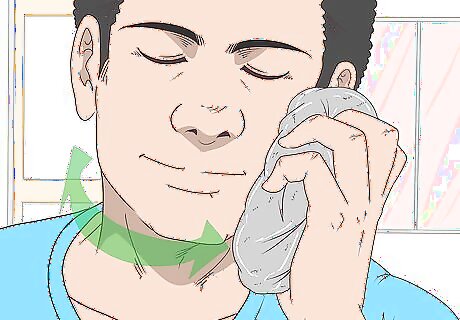
Apply moist heat to your jaw as a bath alternative. If you can’t or don’t want to soak in a tub, you can still soothe your jaw with warm water. Soak a soft cloth in warm water, wring it out, and hold it to your jaw, just below your cheekbone, until the cloth is no longer warm. Switch sides when you’re done, and repeat as needed. You can apply moist heat to your jaw throughout the day and evening.

Talk to your doctor about medical treatments like mouth guards and medications. If your jaw feels consistently tight, stiff, uncomfortable, or downright painful, meet with your doctor to discuss the issue. Depending on your circumstances, they might recommend treatments like: Having a custom-fitted mouth guard made to hold your jaw in a relaxed position. Taking a muscle relaxant medication in the evening. Seeing a mental health professional to manage your stress. Undergoing further testing to see if you have a jaw disorder.














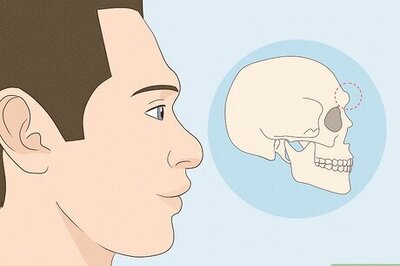


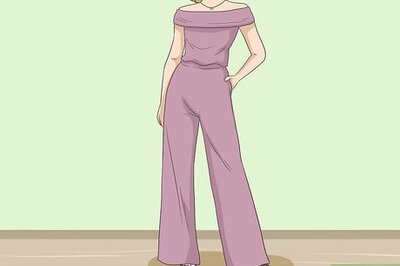
Comments
0 comment